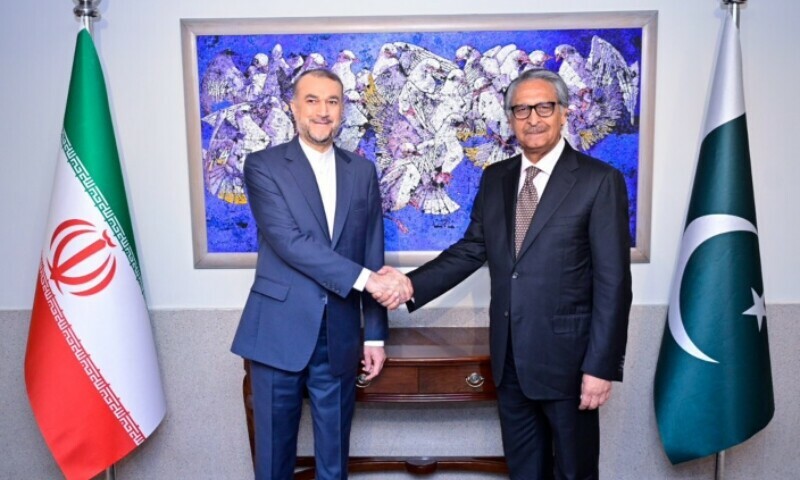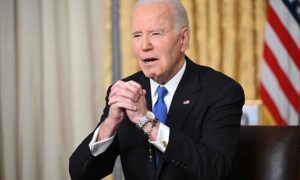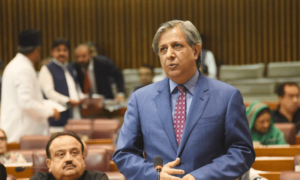Iranian Foreign Minister Hossein Amir Abdollahian, who arrived in Islamabad early on Monday, will hold “comprehensive talks” on enhancing bilateral dialogue and engagement with his Pakistani counterpart, according to the Foreign office (FO).
The development comes days after tensions escalated between the neighbours following an Iranian air strike in Pakistan, leading Islamabad to strike terrorist hideouts in the neighbouring country’s Sistan-Baluchestan province.
While the two countries sought to ease tensions after the deadly cross-border fire, on Saturday nine Pakistani workers were gunned down by unidentified attackers in Sistan-Baluchestan. Pakistan has demanded a comprehensive investigation and swift prosecution of those responsible for the brutal attack.
Abdollahian was received at the Nur Khan airbase by Additional Foreign Secretary (Afghanistan and West Asia) Rahim Hayat upon his arrival in Pakistan. The FO said that the Iranian official would hold “in-depth talks” with Foreign Minister Jalil Abbas Jilani and also call on caretaker Prime Minister Anwaarul Haq Kakar.
Later, the FO shared photos of Abdollahian being welcomed at the Ministry of Foreign Affairs by Jilani.
“The two foreign ministers will hold comprehensive talks to enhance bilateral dialogue and engagement and to further strengthen Pakistan-Iran relations,” the FO said.
Tit-for-tat strikes
Later, Pakistan struck “hideouts used by terrorist organisations namely Balochistan Liberation Army (BLA) and Balochistan Liberation Front (BLF)” in Iran’s Sistan-Baluchestan province, in an intelligence-based operation codenamed “Marg Bar Sarmachar”.
Iran’s IRNA news agency had reported that nine people were killed in the attack targeting a village in the city of Saravan, with Iranian Interior Minister Ahmad Vahidi saying all the dead “were foreign nationals”. Iran had condemned strikes and summoned Pakistan’s charge d’affaires “to protest and request an explanation from the Pakistani government”.
In Islamabad, the escalation had prompted a high-level meeting of Pakistan’s premier authority on security and foreign policy, the National Security Committee. It was chaired by caretaker Prime Minister Anwaarul Haq Kakar with cabinet members, the chairman of the Joint Chiefs of Staff Committee, the chiefs of the Army, Navy and Air Staff, and other heads of intelligence in attendance.
During the hours-long meeting, the NSC had ratified the move towards reducing tensions between Pakistan and Iran and underscored a commitment to addressing mutual security concerns.
“The forum (NSC) expressed that Iran is a neighbourly and brotherly Muslim country, and existing multiple communication channels between the two countries should be mutually utilised to address each other’s security concerns in the larger interest of regional peace and stability,” a statement issued by the prime minister’s office after the meeting said.
The NSC hoped that both countries “would mutually be able to overcome minor irritants through dialogue and diplomacy and pave the way to further deepen their historic relations” but at the same time emphasised that any violation, under any pretext, would be met with the state’s full force.
That sentiment was reciprocated by Tehran, whose foreign ministry, in a statement later that day, had said Iran “adheres to the policy of good neighbourliness and brotherhood between the two nations and the two governments”.
These exchanges had subsequently set the stage for a phone conversation between FM Jilani and his Iranian counterpart.
The two foreign ministers had underscored the importance of collaboration and synchronising efforts at the operational level, with a specific focus on counterterrorism and other mutual concerns. They also committed to de-escalating tensions.
Furthermore, the foreign ministers had deliberated on the reappointment of each country’s ambassadors to their respective capitals, signalling a move towards restoring diplomatic normalcy.
Jilani had also invited Amirabdollahian to visit Islamabad. The Iranian foreign minister, according to the Iranian side, had emphasised that the assurances about security and military cooperation should be seriously pursued.
On Friday, the FO spokesperson said that envoys of Pakistan and Iran had arrived at their respective embassies in Islamabad and Tehran “as per understanding between the two countries”.
- Desk Reporthttps://foresightmags.com/author/admin/
- Desk Reporthttps://foresightmags.com/author/admin/
- Desk Reporthttps://foresightmags.com/author/admin/
- Desk Reporthttps://foresightmags.com/author/admin/






